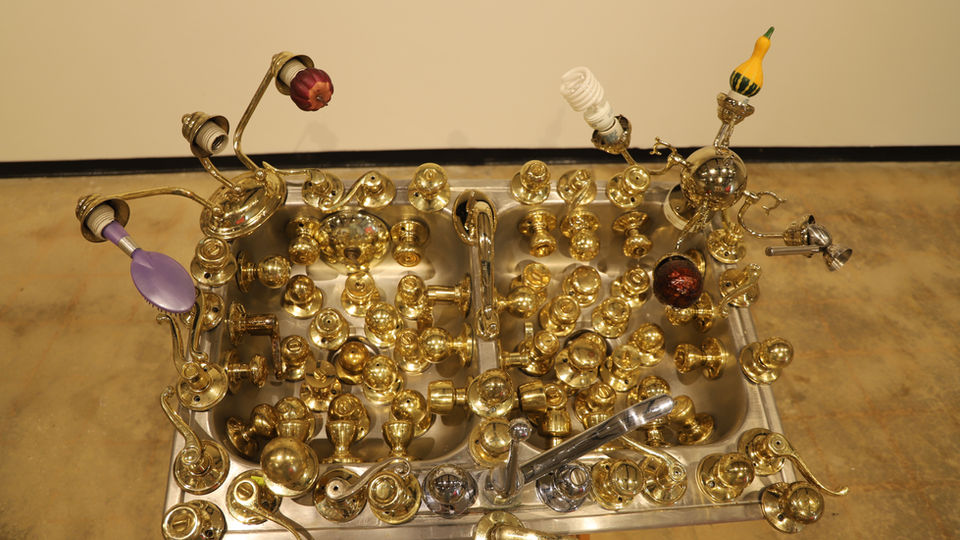MFA THESIS EXHIBITION I
March 19 — April 2, 2021
University & Libby Galleries

Curatorial Statement
As the guest curator for the SA+AH MFA Thesis Exhibition, Untitled 1, I sought to
involve the Art and Art History Department’s graduating students in a process
very similar to the one that they will be involved in as they begin to interact with
institutional curators as their professional careers unfold. This was a process that
involved studio visits; ongoing dialogues around the presentation and framing of
their work, including conversations regarding the history of the media in which
they work and the themes that they were addressing; and finally, a search for
connections between all their projects that would produce a coherent exhibition,
while respecting their distinct points of view by not forcing them into a prescribed
theme that would reflect my current interests more than theirs. If there was a
didactic dimension to the exercise it arose from placing the students in a situation
that mimics what will soon become a central part of their work life: exchanges with
curators, which require a set of skills that are applicable to similar exchanges with
other institutional figures, art writers, and collectors.
Although an overarching theme wasn’t established for the exhibition, there
certainly were points of intersection to highlight between the works presented,
particularly around interrogations of identity and the pervasiveness of consumerist
drives. Both Vahid Valikhani and Foad Seyed Mohammadi, explore the alienating, if
generative in their hands, condition of having to engage an unfamiliar landscape
(thinking here of landscape not only as a physical territory, but of also as a matrix
of cultural habits and expectations). In the process, they recalibrated their use and
understanding of documentary photography.
Emmanuel Opoku recodes geometries and semantic systems usually associated
to particular geopolitical contexts through an unexpected entangling of consumer
objects and, perhaps more interestingly, with some of the “substrate” materials—
roofing materials, plumbing, bathroom fixtures - that give shape to American
suburbs and cities.
Parisa Nabiyouni, immersing the viewer in a virtual reality environment, impels a
consideration from the other side of things: rather than celebrate the appropriation
of mass-produced objects so as to imbue them with new meanings and narratives,
she explores how consumerist logic, as it becomes ever more woven into our lives,
tied into our very nervous systems, turns us into particular kinds of subjects,
imbuing us with artificial desires and drives.
Andrew Stephen Norris explores how what are the often-disparaged forms of
Americana and heartland kitsch can be recharged as instruments through which
to generate and explore queer identities. Lastly, also dredging things from mid-
American sensibility and landscapes, Chad Serhal turns his raw materials into
unexpected and uncanny media artifacts by cutting up films, sound tracking
animations through feedback looping, and arraying collages to function almost like
animation storyboards.
Gean Moreno, Guest Curator
The exhibition will be guest-curated by Gean Moreno, curator and director of the Knight Foundation Art + Research Center at the Institute of Contemporary Art, Miami. Moreno says that he hoped to “involve the Art and Art History Department’s graduating students in a process very similar to the one that they will be involved in as they begin to interact with institutional curators as their professional careers unfold.” The exhibitions will feature work in a diverse array of media, including graphic design, ceramics, installation, painting, printmaking, sculpture, and video.
MASTER OF FINE ARTS CANDIDATES EXHIBITION I
PARISI NABIYOUNI
Parisi Nabiyouni’s video installation seeks to explore how consumerist logic, as it becomes ever more woven into our society turns the consumer into particular kinds of subjects, imbuing us with artificial desires and drives.
ANDREW NORRIS
With his large-scale oil paintings, Andrew Norris explores how the often-disparaged forms of Americana and heartland kitsch can be recharged as instruments through which to generate and explore queer identities.
EMMANUEL OPOKU
Emmanuel Opoku recodes geometries and semantic systems usually associated to particular geopolitical contexts through an unexpected entangling of consumer objects with some of the “substrate” materials—roofing materials, plumbing, bathroom fixtures—that give shape to American suburbs and cities.
CHAD SERHAL
Dredging notions mid-American sensibility and landscapes, Chad Serhal turns his raw materials into unexpected and uncanny media artifacts by cutting up films, sound tracking animations through feedback looping, and arraying collages to function almost like animation storyboards.
FOAD SM (SEYED MOHAMMADI)
Foad recalibrated his use and understanding of documentary photography to explore the often-alienating condition of having to engage an unfamiliar landscape, thinking of landscape not only as a physical territory, but of also as a matrix of cultural habits and expectations.
VAHID VALIKHANI
Through a series of photographs taken from suburban areas in the United States, Vahid forms an overview of landscape construction, altered natural landscapes, and everyday scenes. Through this overview he attempts to represent landscape as a notion driven by structures of power and ideology and calls for a greater awareness of human impact on the environment.




















